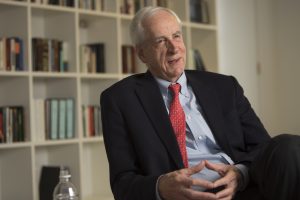If you were to ask me that apparently simple–but actually quite difficult–question, I would pass the buck faster than a politician with Teflon gloves. Only our faculty can answer this question–and rather than answering it once and for all, they must periodically review, reconsider, and redefine the curriculum. Encouraging them to do so now is among my top priorities.
Cornell’s curriculum, like the University itself, is large and complex. The catalog encompasses more than 4,000 courses and 80 undergraduate majors. Seven very different colleges admit undergraduates, and each has its own curricular requirements, as do their many departments.
Our faculty do an admirable job of developing–and teaching–stimulating courses, providing a comprehensive array of choices within each department, and determining the specific skills and areas of knowledge that should be required for each major. Although in recent years the curricular focus has been concentrated at the departmental level, a wider view is equally important: What should every student in the College of Arts and Sciences learn? How about Engineering, Agriculture and Life Sciences, Human Ecology, the ILR School, Hotel Administration, Architecture, Art and Planning? Are therecertain things that all Cornell undergraduates should learn?
A curriculum is much more than an exhaustive list of courses and requirements. “The curriculum is the major statement any institution makes about itself, about what it can contribute to the intellectual development of students, about what it thinks is important in its teaching service to society,†says the Carnegie Foundation for the Advancement of Teaching.
Making that “major statement†is the prerogative of the faculty, and I am pleased to support them as they reexamine and refine the curriculum in a faculty-designed and faculty-driven process. The College of Arts and Sciences is currently undertaking a fundamental review of its curriculum. That is essential because A&S has Cornell’s core departments, and the other colleges depend upon it for many of their undergraduates’ courses.
Our faculty consider the curriculum in a context much larger than that of a single university. In the United States today, the ideal of liberal education has lost its luster, and universities have not done a particularly good job defending it. In vogue is a more vocational view of higher education. The “payoff” tends to be quantified solely in dollars: salary level after graduation, lifetime earnings potential, guaranteed qualification for aspecific and preferably high-paying career.
This tendency is understandable given the high cost of college and the recent recession. And it is true that a college degree is now almost essential for a rewarding career, and that its lifetime dollar value compared to a high school diploma is higher than ever. Yet a college degree is much more than a job ticket, and I do not believe that money is the sole, or even the principaljustification for it.
“Liberal” in the phrase “liberal education” is not related to ideology but to freedom. In the original Latin sense, a liberal education is one suited to shaping free citizens. And our democracy today needs educated citizens more than ever.
We must also clear up a common misperception: many people think the term “liberal education” covers only the humanities, such as history, philosophy, and literature. In fact, it includes the so-called hard sciences too. Physics, chemistry, mathematics, and the life sciences, as well as the arts, humanities, and social sciences, are all part of a liberal education.
Its basic components are critical thinking, close reading, effective speaking and writing, and quantitative and ethical reasoning. Those forms of knowledge carry over into later life and transfer to virtually any career. They also help to produce more thoughtful citizens–informed participants in debates over public issues, people with a sense of civic responsibility and with an understanding of the larger world with its multitude of cultures and perspectives. Empathy, compassion, and creativity also flourish when nurtured by a liberal education.
To ensure that Cornell students graduate with these capacities, our faculty are working to make the curriculum more effective. As one who loves learning, liberal education, and Cornell, I am delighted to watch as our faculty gets this vital process vigorously under way.
— Hunter R. Rawlings III, Interim President
president@cornell.edu



